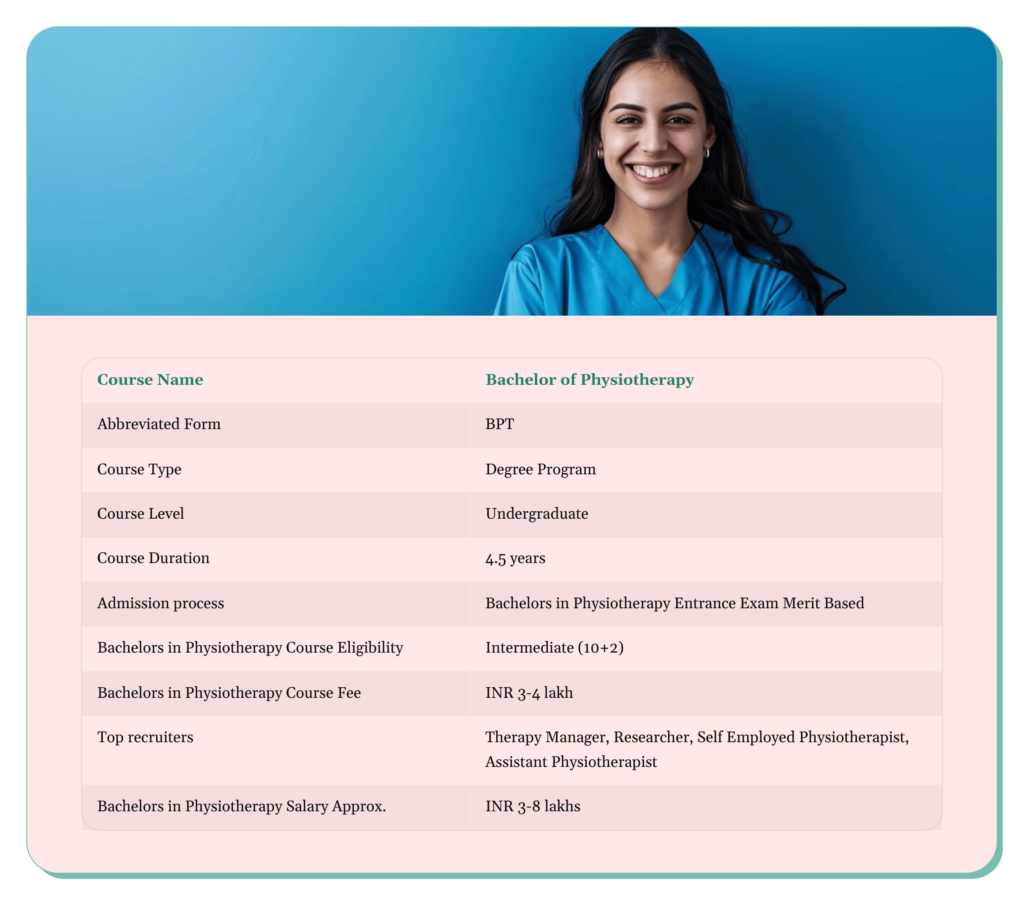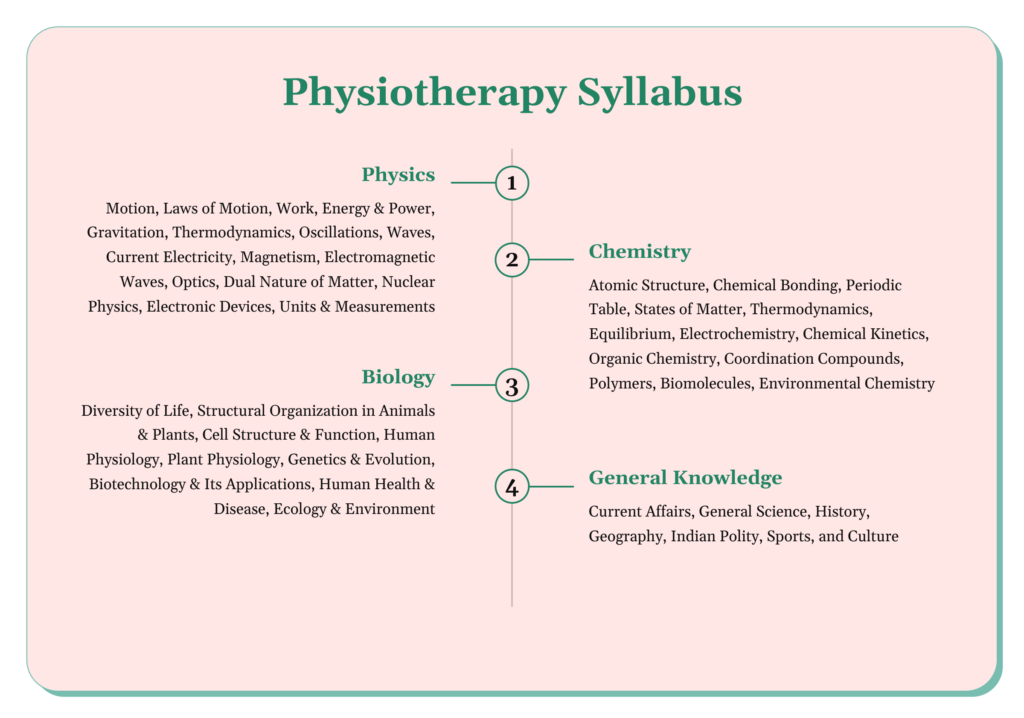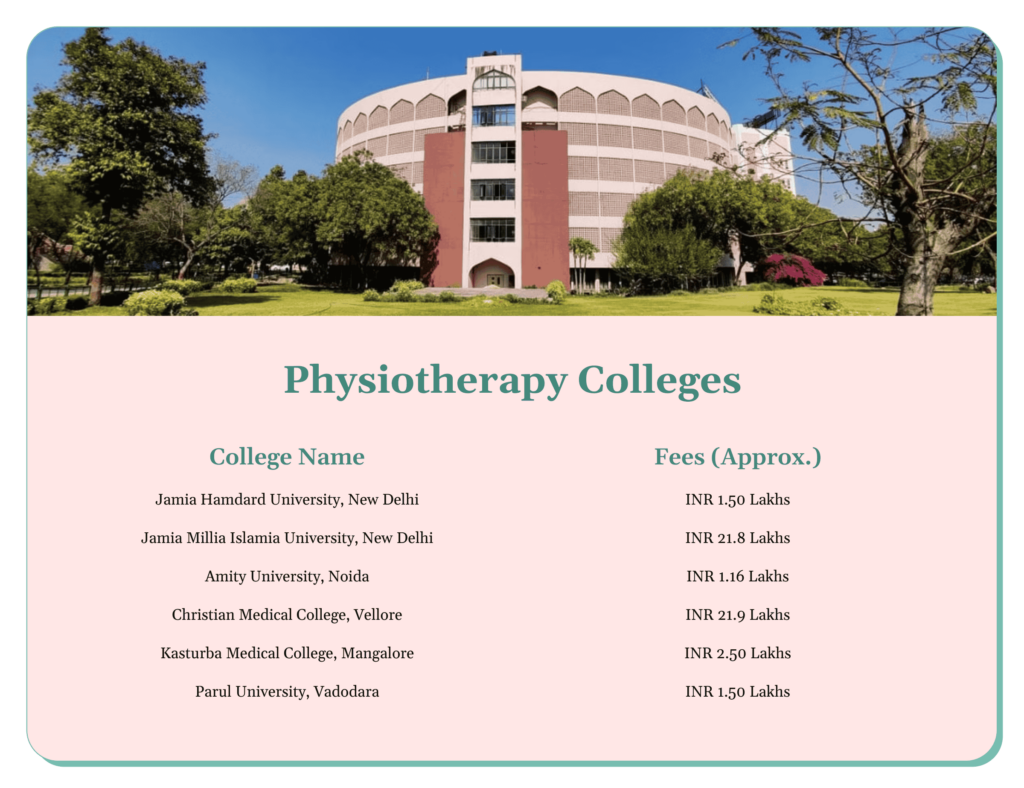

Quick Summary
A physiotherapy course, usually represented as a Bachelor of Physiotherapy (BPT) program, is a comprehensive undergraduate degree informing students on the science of physical rehabilitation. It incorporates a variety of core subjects, such as anatomy, physiology, and biomechanics.
Practical and theoretical components cover therapeutic exercise, manual treatment techniques, electrotherapy, and more. A clinical internship is also required.
Successful completion of a Bachelor’s degree in physiotherapy prepares the graduate to assess, diagnose, and treat many physical impairments and disabilities across a variety of health care and community settings.
Physiotherapy is a healthcare profession dedicated to restoring movement and function in individuals affected by injury, illness, or disability. It involves therapeutic exercises, manual therapy, and education to help patients manage pain and regain mobility. Physiotherapists play an essential role in rehabilitation, particularly in cases involving post-surgical recovery, neurological disorders, and sports injuries.
With an increasing demand for rehabilitation services due to an aging population, chronic illnesses, and sports-related injuries, the physiotherapy profession in India is experiencing rapid growth.
The World Health Organization recommends a physiotherapist-to-population ratio of 1:10,000, indicating the need for approximately 1.4 lakh physiotherapists in India. This rising demand ensures that a career in physiotherapy offers stability, growth, and the opportunity to contribute meaningfully to the healthcare sector.

Physiotherapy is one of the most rewarding occupations. It involves helping someone, whether you work with a premature child whose growth is delayed or support an elder who is regaining their ability to walk. A solid understanding of the Bachelor in Physiotherapy course entrance exam syllabus is crucial for those aspiring to enter this fulfilling field.
Let us discuss the essential qualities required to become a physiotherapist.
As a therapist, you help people improve their motor skills through exercise or repetitive motions. It is important to have talents yourself before attempting to give them to others.
You must establish a rapport with your client to handle any issues that may arise, such as frustration with rehabilitation or the discomfort they are experiencing. To succeed in this role, you should use a few interpersonal skills that can assist you in getting through it successfully. Additionally, familiarity with the Bachelor in Physiotherapy course entrance exam syllabus can help you develop the necessary skills for effective client interaction.
Students pursuing a bachelor’s degree in Physiotherapy must study science in their junior classes. This will help them become the best professionals in this field. A physio who knows science is always better than one who does not.
You might work alone without help, but you may also work with a team. So, you must be able to gel well with other people.
A physiotherapist needs to express themselves well in order to help patients fully. If your patient does not understand you, they will not trust you. Faith and belief are vital for a physio in the long run. Hence, communication skills are very essential.
There are some other soft skills that you must acquire. These are:
Thus, these skill sets will allow you to love your work by developing empathy for it.
The specific qualification for a Physiotherapy course can depend on both the country and the institution. It is very important for prospective candidates to review the specific eligibility requirements for the Physiotherapy course for each institution they are interested in.
The requirements can vary significantly from program to program and from country to country.
The Physiotherapy course based on Class 12 are as follows.
| Physiotherapy Course Level | Physiotherapy Course Eligibility |
|---|---|
| UG | 50% in BPT and pass the admission exam to be admitted to MPT programmes. Additionally, candidates must complete a minimum of six months as an intern in this profession to be eligible for MPT courses. Admission to the MSc in Physiotherapy programme is based on performance on the university’s graduation and MSc entrance tests. |
| PG | Passing the Class 12 examination is requiredMinimal percentage is necessary by the college |
| Diploma | Passing the Class 12 examination is required. A minimal percentage is necessary by the college |
| Doctorate | MPT or any other relevant Master’s degree. |
Note: This information is sourced from the official website and may vary.
Candidates can check a more or less definitive outline of the admission process for the Physiotherapy degree in India below:
Eligibility: Candidates must have completed Class 12 with Physics, Chemistry, and Biology with 50%-60% minimum aggregate depending on the institute.
Entrance exam: Some institutes require candidates to sit an entrance exam, whereas others may allow students based on the merit of their 12th grade.
Application: Candidates need to register online on their respective college or university website and provide their academic information and/or the entrance exam score (if applicable).
The BPT Entrance Exam Syllabus is a 4-year program divided into two semesters each year. Throughout the course, students must complete various assignments, tests, and presentations that help assess their understanding of the subjects. These activities play a key role in reinforcing theoretical knowledge and practical skills. The course is designed to provide a strong foundation in physiotherapy, preparing students to handle real-world healthcare situations and work effectively with patients.
Additional Bachelor’s in Physiotherapy undergraduate degree divisions include several core and elective disciplines. The structure of the course is as follows:
In India, physiotherapy is taught through a variety of courses offered at different educational levels. These programs are designed to give students in-depth knowledge and practical training, helping them build successful careers as physiotherapists.
Here are some of the popular physiotherapy courses available across the country:
Final Admission: After a candidate has been selected, they must complete the document verification process and pay the required fees.
Selection: The admission process for a Physiotherapy degree is merit-based, from candidates’ 12th marks and/or entrance exam score, with the possibility of counselling/ interview.
Application: Candidates need to register online on their respective college or university website and provide their academic information and/or the entrance exam score (if applicable).
Entrance exam: Some institutes require candidates to sit an entrance exam, whereas others may allow students based on the merit of their 12th grade.
Eligibility: Candidates must have completed Class 12 with Physics, Chemistry, and Biology with a minimum aggregate of 50%-60% depending on the institute.
Undergraduate physiotherapy courses in India usually span 4.5 years, which includes a compulsory internship. These programs focus on foundational subjects like anatomy, biomechanics, and rehabilitation techniques to prepare students for real-world clinical practice.
Here are some of the commonly offered physiotherapy courses at the UG level in India:
| Physician Assistant Course | College Name | Total Fees (INR) |
|---|---|---|
| BPT | Jamia Hamdard | 6.6 Lakh |
| Jamia Millia Islamia | 98,100 | |
| Sanjay Gandhi Postgraduate Institute of Medical Sciences | 2.2 Lakh | |
| Saveetha Institute of Medical and Technical Sciences, Poonamallee | 10.13 Lakh | |
| LPU | 4.8 Lakh – 6.4 Lakh | |
| BSc | Christian Medical College & Hospital Ludhiana | 1.3 Lakh |
| NIMS College of Physiotherapy and Occupational Therapy, NIMS University | 2.8 Lakh | |
| Era University | 4.4 Lakh | |
| Sun Rise University | 80,000 | |
| Al-Karim University | 3.4 Lakh | |
| BVoc | Jamia Millia Islamia | 1.33 Lakh |
| The Indira Gandhi Technological and Medical Sciences University | 2.02 Lakh | |
| University of Technology Jaipur | 1.5 Lakh | |
| Glocal University | 1.5 Lakh | |
| Maa Gange Institute of Hotel Management and Professional Studies | 1.95 Lakh |
Note: This information is sourced from the official website and may vary.
Postgraduate physiotherapy courses in India typically last 2 years and offer opportunities to specialize in areas such as Neurology, Orthopedics, Sports Physiotherapy, and Cardiopulmonary Physiotherapy. These programs provide advanced clinical training to help professionals deepen their expertise and grow in their chosen field.
Here are some of the popular physiotherapy courses available at the PG level in India:
| Physician Assistant Course | College Name | Total Fees (INR) |
|---|---|---|
| MPT | Jamia Hamdard | 3 Lakh |
| Christian Medical College, Vellore | 2,400 | |
| Jamia Millia Islamia | 2.2 Lakh | |
| Saveetha Institute of Medical and Technical Sciences, Poonamallee | 2.5 Lakh – 4.85 Lakh | |
| Delhi Pharmaceutical Sciences and Research University | 1.6 Lakh | |
| MSc | SGT University, Gurgaon | 1.75 Lakh |
| Arunachal University of Studies | 3 Lakh |
Note: This information is sourced from the official website and may vary.
Doctorate-level physiotherapy courses in India are research-focused and delve deep into areas like rehabilitation techniques, biomechanics, and advanced physiotherapy interventions. These programs are ideal for those looking to build careers in academics, research, or specialized clinical practice.
Doctorate-level physiotherapy courses in India are research-focused and delve deep into areas like rehabilitation techniques, biomechanics, and advanced physiotherapy interventions.
These programs are ideal for those looking to build careers in academics, research, or specialized clinical practice.
| Physician Assistant Course | College Name | Total Fees (INR) |
|---|---|---|
| PhD | LPU | 3 Lakh |
| Amity University, Noida | 3 Lakh – 3.02 Lakh | |
| DMIHER | 3 Lakh | |
| Parul University | 3.75 Lakh | |
| Integral University – IUL | 1.5 Lakh |
Note: This information is sourced from the official website and may vary.


There are no standard entrance examinations for admission to the BPT course. However, some universities that offer the program hold entrance exams for their college.
Candidates must perform better than the required minimum in these entrance exams to be admitted to their preferred Bachelor’s in Physiotherapy college. A minimum of 50% overall (45% for SC/ ST) in the 10+2 board exams is required for admission to the BPT (Bachelor of Physiotherapy) course.
Different criteria apply depending on the category. The list below includes some entrance tests for India’s BPT (Bachelor of Physiotherapy) courses.
| Exams | Registration | Exam Dates |
| VEE | December 2024 – April 2025 | 13 May, 2025 |
| BCECE | 20 May – 20 June, 2025 | 24 July – 25 July, 2025 |
| IPU CET | 04 March – 31 May, 2025 | 18 June – 19 June, 2025 |
| LPUNET | 11 April – 25 May, 2025 | 15 May – 31 May, 2025 |
People can get admission to a Bachelor of Physiotherapy through college entrance tests. The physiotherapy course duration remains four years. The admission process is based on merit, i.e., on the scores obtained by the candidate in the 10+2 board examinations.
Interested applicants for BPT admission must possess a minimum passing mark of 50% (45% for SC/ST). Some significant BPT course admission exams include the ones listed below:

Here is a list of the top colleges offering the BPT Course. The approximate physiotherapy course fees are also shown below.

After completing the Bachelor’s in Physiotherapy course, individuals can pursue further studies to specialize in various fields. They may opt for a Master’s in Physiotherapy (MPT) to focus on orthopedics, neurology, or sports physiotherapy. Additional certifications and courses in pediatric or geriatric physiotherapy are also available. Specializing helps individuals gain expertise in their chosen field and enhances career opportunities in hospitals, clinics, sports teams, and rehabilitation centers.

Here is a list of the specialist courses people can choose after getting a physiotherapy degree –
The following are the most sought-after career options after BPT in India:
There are various roles and responsibilities of a Physiotherapist, which include:
Overall, the Physiotherapy course is robust and requires dedication and commitment from students seeking to enter this rewarding field.
The average salary of a Physiotherapist varies from place to place, but the average salary is 3.46 lakhs per annum.
Source: Payscale.com
There are various roles and responsibilities of an Osteopath, which include:
In addition to providing health advice, you’ll employ to treat a variety of illnesses, such as:
A top-notch Osteopath may earn up to 25 lakhs per annum. (Source: SalaryExpert)
Physical therapists work with patients to treat physical issues brought on by disease, injury, disability, or age. The role of a private physiotherapist includes:
An excellent private physiotherapist earns up to INR 20 lakh, but the minimum average salary of a private practitioner can start from INR 8 lakh.
(Source: Payscale)

Trainers have many responsibilities to undertake, which include:
Many physiotherapists combine their practice with other athletic-related jobs. The average salary of a sports physiotherapist starts at INR 4.7 lakh.
(Source: Ambition Box)
The Therapy Manager has a lot of responsibilities to fulfill. These include:
The average salary of a Therapy Manager can be a minimum of INR 4.3 lakh.
A lecturer or teacher in the field of physiotherapy is to impart knowledge to the students. The following are the responsibilities of a lecturer:
The average salary depends on the university or college one is teaching in. An average fresher can earn up to 6 LPA as a fresher physiotherapist.
(Source Credit: Ambition Box)
A lecturer or teacher in the field of physiotherapy is to impart knowledge to the students. The following are the responsibilities of a lecturer:
He/she will participate in intellectual endeavors and carry out charitable deeds. The lecturer will collaborate with the college and community on projects. This is one of the ideal jobs for people seeking a comfortable life after studying this course.
Getting into a Bachelor of Physiotherapy (BPT) program requires careful preparation and a well-planned approach to the entrance exam. Aspiring students should understand the exam syllabus, focus on key subjects like anatomy, physiology, and general knowledge, and practice regularly with mock tests. A strong understanding of the topics and consistent preparation can significantly increase the chances of success in the entrance exam, helping students secure a spot in a reputable BPT program.
Here are some practical tips to help you cover the BPT entrance exam syllabus –
The BPT entrance exam syllabus typically includes subjects like biology, physics, chemistry, anatomy, and general awareness. Download the official syllabus and create a detailed study plan to cover all the essential topics systematically.
Since physiotherapy is rooted in human anatomy and physiology, biology plays a critical role in the exam. Prioritize human anatomy, genetics, plant physiology, and ecology topics.
Master fundamental concepts in physics and chemistry, especially those related to mechanics, thermodynamics, chemical bonding, and organic chemistry. A clear understanding of these subjects is vital for solving problem-based questions efficiently.
Solve mock tests and previous years’ question papers to familiarize yourself with the exam pattern and identify weak areas. Time yourself during these tests to improve speed and accuracy.
Choose trusted textbooks and reference materials that align with the BPT syllabus. Supplement your learning with online tutorials and video lectures to better understand complex topics.
In conclusion, preparing for the BPT entrance exam requires a clear understanding of the topics, a good plan, and regular practice. Focus on the BPT entrance exam syllabus, practice often, and keep up with important subjects to build a strong base. Make a plan that balances study and rest, as well as care for your health and well-being. With hard work and the right approach, you can confidently secure a spot in a good physiotherapy program and start a fulfilling career in healthcare. Stay positive, stay focused, and work towards your goals!
The demand for physiotherapists is growing rapidly in India, offering excellent career opportunities in the healthcare sector.
Completing the Bachelor of Physiotherapy (BPT) course is essential to becoming a physiotherapist. Understanding the BPT entrance exam syllabus is a crucial part of this journey.
By mastering the BPT entrance exam syllabus, you can take the first step toward a fulfilling career as a physiotherapist. This essential preparation ensures that you have the knowledge to succeed in your studies and career.
The syllabus includes various subjects related to anatomy, physiology, and basic medical knowledge, which are vital for treating patients.
By mastering the BPT entrance exam syllabus, you can take the first step toward a fulfilling career as a physiotherapist. With a strong foundation in physiotherapy principles, you’ll be ready to meet the growing demand for healthcare professionals and provide valuable support to those in need. Start your journey today and explore the opportunities in this rapidly expanding field.
Evaluate numerous career choices to choose the right career path for yourself. Dive into our guide on Career Options.
A physiotherapist cannot prefix the title “Dr.” The Rehabilitation Council of India has registered physiotherapists as experts in rehabilitation. However, they do not have the required legal eligibility as per the Indian Medical Council Act of 1956. Additionally, they should not use the prefix “Dr.” before their name in their prescription to represent them as specialist medical practitioners.
Candidates do not need a NEET score to be admitted to the Bachelor of Physiotherapy program. For the BPT course program, separate entrance examinations are held. Candidates qualifying for the physiotherapist entrance exams are enrolled in the Bachelor of Physiotherapy course in the respective institution. Some of the popular entrance exams for the Bachelor of Physiotherapy course are:
1. VEE
2. BCECE
3. IPU CET
4. LPUNET
These two courses differ in several ways. MBBS focuses on medical practice and training to become surgeons, but physiotherapy is different. It focuses on treating illnesses and disabilities. The MBBS program aims to educate students about the different aspects of medicine, while Physiotherapy is concerned with rehabilitation processes and remedies to cure injuries.
These are some of the best BPT courses you can pursue. These courses uplift the skills and knowledge of candidates.
1. Cardiovascular & Pulmonary specialties
2. Neuro-Physiotherapy
3. Sports-Physiotherapy
4. Community Physiotherapy
The Bachelor of Physiotherapy (BPT) course typically lasts for 4 years, followed by a 6-month mandatory internship. During these 4 years, students learn various subjects related to anatomy, physiology, kinesiology, and therapeutic techniques. The internship provides practical experience, allowing students to apply their knowledge and skills in real-world healthcare settings.
By mastering the subjects related to the Physiotherapy course, candidates can take significant steps towards a successful and fulfilling career in healthcare.
As the demand for physiotherapy services continues to rise, pursuing a career in this field can be highly rewarding. The Physiotherapy course equips students with the necessary skills to excel in various healthcare settings.

Authored by, Gagandeep Khokhar
Career Guidance Expert
Gagandeep is a content writer and strategist focused on creating high-performing, SEO-driven content that bridges the gap between learners and institutions. He crafts compelling narratives across blogs, landing pages, and email campaigns to drive engagement and build trust.
Editor's Recommendations
Chegg India does not ask for money to offer any opportunity with the company. We request you to be vigilant before sharing your personal and financial information with any third party. Beware of fraudulent activities claiming affiliation with our company and promising monetary rewards or benefits. Chegg India shall not be responsible for any losses resulting from such activities.
Chegg India does not ask for money to offer any opportunity with the company. We request you to be vigilant before sharing your personal and financial information with any third party. Beware of fraudulent activities claiming affiliation with our company and promising monetary rewards or benefits. Chegg India shall not be responsible for any losses resulting from such activities.